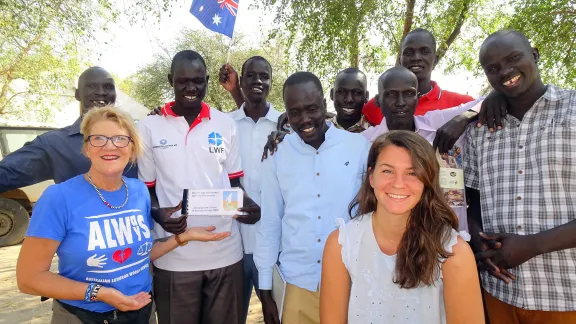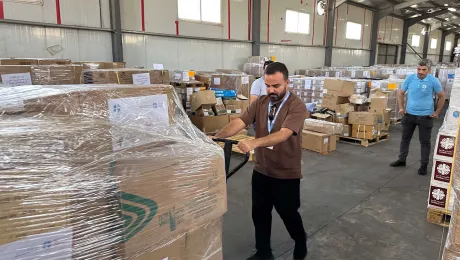
ALWS staff visit a community in Jonglei, South Sudan, in January 2020. Photo: ALWS/ Julie Krause
LWF congratulates Australian Lutheran World Service on their anniversary
(LWI) - The Lutheran World Federation (LWF) congratulates its related agency, the Australian Lutheran World Service (ALWS), on its 70th anniversary.
“Over the decades, you have supported our work in countries which others have forgotten. You have remained true to where you see the greatest need and where you’ll have the deepest impact,” wrote Maria Immonen, director of LWF World Service, in a letter to Jamie Davis, head of ALWS.
Started as a resettlement program for Europeans after the Second World War, ALWS is the diaconal arm of the Lutheran Church in Australia. ALWS and LWF currently work together in 11 countries.
“Your contribution to address poverty and injustice has extended well beyond your financial support. Instead, we have witnessed it at many levels: as staff in our country programs, as senior managers in our global office, and as active board members of our Committee for World Service,” Immonen added. “You have influenced policies which have made a lasting difference, especially in the areas of child protection, disability inclusion, and gender justice.”
Faith as a constant
The roots of ALWS reach back as far as the LWF’s. In 1947, Australia resettled people displaced by war in Europe, offering them a new home in their country. Many of the European migrants arriving at the Bonnegilla Migrant Centre near Victoria, Australia were Lutherans. A pastor of the nearby Lutheran congregation, Rev Bruno Muetzelfeld, began to visit them. He soon became a full-time chaplain at the reception center.

Dr Brian Neldner (far right) with European migrants before their resettlement, at the Bonnegilla reception center in Australia. Photo: ALWS
As the new arrivals were placed in different towns across the country, the Lutheran team at the Bonnegilla center would inform the Lutheran pastor in their new town about their arrival. “This meant people had a pastor supporting them from their homeland to Bonegilla and then to their new home. Their faith may have been the only constant through this unsettling time,” notes Jen Pfitzner, ALWS Communications officer.
The initiative became an agency when the Lutheran World Federation, which was founded three years earlier, needed a base of operations in Australia to help with resettlement. In 1950, Lutheran World Service-Australia (LWS-A) was founded, a filial to the LWF. In the next five years, they would resettle 2,350 people, provide travel loans, and facilitate family reunifications, bringing in relatives the refugees had left behind in Europe. LWS-A also supported the Lutheran congregations, which were now rapidly growing with all the new arrivals.
From Australia to Africa
When the Lutheran Church in Australia was established in 1960, LWS-A became their development agency. As the need to resettle migrants and support their integration in Australia had diminished, LWS-A now focused on help to displaced people overseas, by supporting LWF World Service country programs outside Australia.
In the following decades, this agency would send donations by Australian Lutherans, and later also official government support, to LWF operations in about 20 countries worldwide. Joint operations, some of them to this day, include Angola, Bangladesh, Cambodia, Djibouti, El Salvador, Ethiopia, Haiti, India, Jerusalem, Nepal, Malawi, Mauritania, Mozambique, South Africa, Tanzania, Uganda, and Zambia.

Handover: Pastor Bruno Muetzelfeldt (far right), who began visiting Lutheran migrants at Bonegilla Migrant Centre in 1947, with the staff of Lutheran World Service–Australia office, on the day he departed for Geneva to serve with LWF. Also, from left, Pastor Muetzelfeldt’s LWS-A successor Brian Neldner, Eeva-Liisa Viheriakoski, Ora Simpfendorfer, Lorna Koetz, Margaret Bruveris. Photo courtesy Dr Brian Neldner.
From filial to partner
In 1985, Australian law changed and LWS-A became an independent organization, named Australian Lutheran World Service (ALWS). It has been a strong partner of LWF World Service, supporting country programs, communities in need and LWF member churches in emergencies. To this day, Lutherans in Australia work to welcome and integrate resettled refugees, which no longer come from Europe, but from Asia and Africa.
Visiting the ALWS in 2017 I was impressed to see the strong position of the ALWS as it mobilizes local communities for the sake of the neighbor in a global perspective.
“Visiting the ALWS in 2017 I was impressed to see the strong position of the ALWS as it mobilizes local communities for the sake of the neighbor from a global perspective. Visiting Nepal in 2018, I was able to see the strong partnership of the LWF with ALWS, delivering meaningful support to local communities accessing their rights. LWF is very grateful for this partnership and how it impacts on people’s lives,” says Rev Dr. Martin Junge, General Secretary of the LWF.
It seems our work is far from complete. (…) We look forward to continuing our partnership for many years to come, as together we reach out in love … for justice.
Organizations such as ALWS and LWF should not need to exist in the first place, Immonen writes, but looking at 80 million people forcibly displaced worldwide, “they are as necessary today as they were 70 years ago. It seems our work is far from complete. (…) We look forward to continuing our partnership for many years to come, as together we reach out in love … for justice.”


